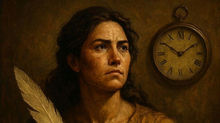Ana Stjelja: “Mother Goddess” - A Documentary Journey Across Cultures by Srđan Marković
- Web Portal Eastern Pearl

- Mar 29, 2024
- 3 min read
The documentary “Mother Goddess” by Srđan Marković explores the theme of womanhood. It is not a feminist documentary and does not focus on the topic of feminism. It is a film about woman as an archetype, a mother, and a creator. One who has been and remains in touch with nature.

Gloria Steinem,
journalist and political activist
In a world where patriarchal norms have often overshadowed the role of the divine feminine, a groundbreaking documentary seeks to shed light on the enduring presence and significance of the Goddess Mother archetype in various cultures. Through interviews with modern intellectuals, the film delves into the diverse manifestations and representations of the “Mother Goddess”, offering a rich tapestry of insights and perspectives.
The documentary explores how different cultures have revered and celebrated the divine feminine throughout history. Through engaging conversations with scholars, theologians, and cultural experts, viewers are invited to embark on a journey of discovery, uncovering the nuanced layers of symbolism and meaning associated with the “Mother Goddess” archetype.

One of the key themes explored in the documentary is the significance of the Mother Goddess as a symbol of fertility, creation, and life-giving energy. Across cultures, she is often depicted as the source of nourishment and abundance, representing the cyclical rhythms of nature and the interconnectedness of all living beings. Through thought-provoking discussions, the film examines how these ancient myths and symbols continue to resonate in the modern world, offering a source of inspiration and empowerment for people of all genders.
Moreover, the documentary delves into the ways in which the representation of the Mother Goddess has evolved over time, reflecting shifting cultural attitudes and societal norms. From ancient sculptures and mythological tales to contemporary art and literature, the film explores how artists and creators have reimagined and reinterpreted the divine feminine, infusing her with new meanings and relevance for today's world.

Ultimately, this documentary serves as a celebration of the enduring power and significance of the Goddess Mother archetype across cultures. By weaving together insights from diverse perspectives, the documentary offers a compelling portrait of a universal symbol that continues to inspire awe and reverence in the hearts and minds of people around the globe. Through its exploration of mythology, symbolism, and cultural history, the film invites viewers to reconsider their relationship with the divine feminine and to recognize her presence in the world around them.

North Macedonian musical group “Perja”
In the film, women speak, from Serbian and American intellectuals, artists, writers, poets, activists to Macedonian musicians to peasant women from Central Asia engaged in various crafts and artistic endeavors.
Srđan Marković / Bookstore “Utopia”
The author himself is a writer, world traveler and author of various documentaries, a Serb who spent a part of his life in America, gradually falling in love with the East. His journeys through the Middle East, Central Asia, especially Uzbekistan, Iran, Mongolia... exploring different religions and beliefs, from Buddhism through Islam and Sufism to Shamanism. He runs unique bookstore “Utopia” in the heart of Belgrade.

Razia Sultanova
One of the special interviewees in the film was Razia Sultanova, a scholar of the Cambridge Central Asia Forum, University of Cambridge, and director of the Center for Central Asian Music. She graduated from the State Conservatory of Uzbekistan and obtained her doctorate from the Moscow State Conservatory, where she is a visiting professor.

“From Shamanism to Sufism: Women, Islam, and Culture in Central Asia”
She has also worked as a research associate at Goldsmiths College and the School of Oriental and African Studies, University of London. Her interests include the culture and music of Russia, Central Asia, and the Middle East. Srđan Marković is also the editor of Razia Sultanova's book titled “From Shamanism to Sufism: Women, Islam, and Culture in Central Asia” (Utopia, 2022).

Nina Živančević
One of the interviewees is also Nina Živančević (1957) Serbian-born poet, playwright, fiction writer, translator, scholar, performer, curator and art critic. She apprenticed as a young poet with Allen Ginsberg and has gone on to work in various capacities as both a writer and scholar of experimental, underground and avant-garde literature.















































Comments